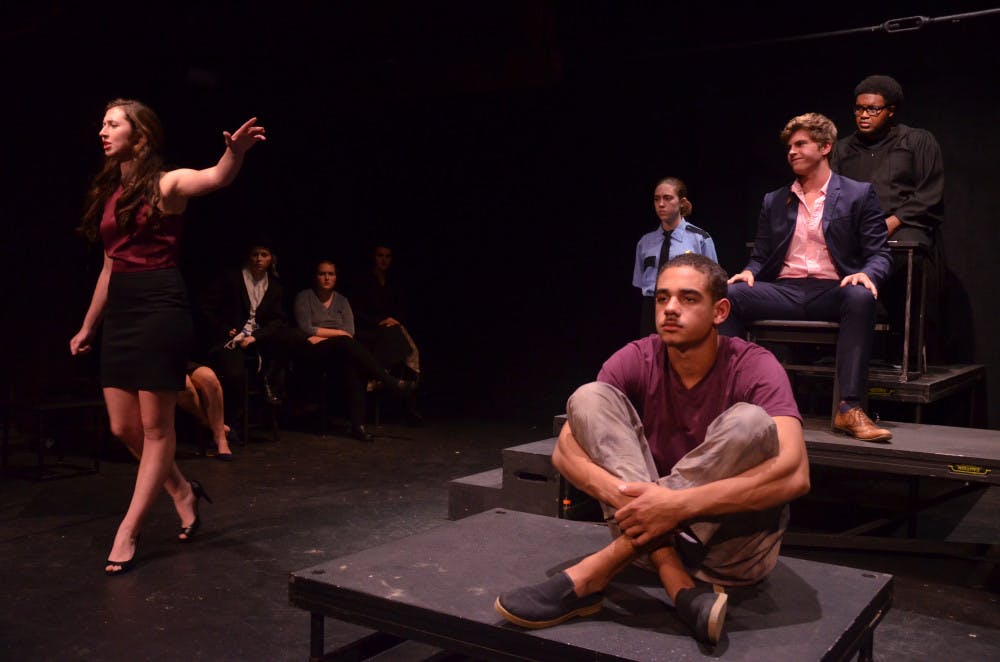Pulsating music and dim lights greeted audiences as they entered the makeshift courtroom and took their seats in what felt like a jury box. The hunched figure of the Bible’s most famous sinner sat squarely in the middle of the stage.
Such was the setup of the 20th annual first-year show, The Last Days of Judas Iscariot by Stephen Adly Guirgis, which ran from Oct. 15 to 17 in the Hepburn Zoo. A tradition dating back to 1996, the first-year show gives new students an immediate opportunity to participate in the Middlebury College Theatre Department. Like many years before, the cast worked with a graduate from the College. Tara Giordana ’02 took the reins this fall to direct the often dark, often funny production of The Last Days of Judas Iscariot.
Set in a corner of Purgatory called Hope, the play depicts the trial of its titular character for his betrayal of Jesus Christ. A trial is both the simplest and most complex stage for this show: While we would all like to believe that the truth will come out, we do not always like to believe the truth itself. And the truth is, Judas is just like us.
Everyone from Mother Teresa to Sigmund Freud to Satan gives testimony, while appearances from Saints Thomas, Peter and Monica enlighten us to Judas’s life. But as the characters grapple with their own crimes and their judgments of Judas, the trial ends up unveiling more tension than honesty. Throughout the entire performance, Judas, played by first-time actor Alexis de la Rosa ’19, sat curled up in the middle of the stage, judgments orbiting wildly around him. Meanwhile, the audience members became keenly aware of their role in the story as jurors, and thus the ultimate deciders of his guilt.
The annual first-year show opens doors for students to explore the multiple facets of theater. Two first-years, Tatsatom Goncalves ’19 and Sabina Jiang ’19, participated in the sound and light board operation and acted as assistants to the director. Working alongside them were upperclassmen Aashna Aggarwal ’16, Alexander Burnett ’16, Caitlin Duffy ’15.5 and Tosca Giustini ’15.5, who used their theatre experience to offer support to the newcomers.
Because the cast consisted solely of first-years, the actors found solidarity through their shared anxieties. They were also able to build a sense of community, equality and lightheartedness in their work.
“I was inspired by my peers,” Lucy Grindon ’19, who played Bailiff and Sigmund Freud, said.
Rehearsals for The Last Days of Judas Iscariot spanned merely three weeks. Madeleine Russell ’19, who portrayed both Jesus of Nazareth and Fabiana Aziza Cunningham, described director Giordana as “funny, lighthearted and kind.”
“Tara is phenomenal, perceptive and clear in her understanding of what the play is about,” Russell said. “She was also good at including the cast in creating the meaning [of the play].”
This meaning, Giordana believes, resides in the characters’ internal conflicts.
“In the end, Judas is unable to forgive himself,” she explained. “His best friend, Jesus, offers him love and forgiveness, but Judas is unable to recognize and accept it, because he has sunk too far into despair.”
Self-love and forgiveness play thematic roles in the production, which questions whether we can accept love from others if we cannot give it to ourselves first. The answer is presented in a religious context, but delivered in an accessible manner, with modern language and garb.
Lucy Grindon ’19 observed that, as a Christian, she felt closer to the story because she was able to see the figures she had only read about emerge in living, breathing form.
Though the majority of the characters come straight from the Bible, the messages behind the play remain relatable to people of all beliefs.
“I think the play resonates regardless of what you believe in,” Sam Martin ’19, who played El-Fayoumy, said. “Guilt, redemption and forgiveness are hardly unique concepts to Christianity, so I think the play is pretty universal in terms of the questions it asks and the ideas it presents.”
This universality ultimately forces the audience to make their own judgments about not only Judas, but also themselves. If Judas Iscariot and a seemingly normal man like Butch (portrayed by Logan Wahl ’19) are both capable of betraying those who love them most, what about the rest of us?
A story so layered demands an equally complex production. As such, the original version of The Last Days of Judas Iscariot runs for a full three hours. Giordana was faced with the challenge of cutting it down to a mere 80 minutes.
“I selected scenes and monologues from the script and then made internal cuts to the text as well,” she explained. “This was based on the actors I had — to give each an opportunity to shine — but another goal was to keep the playwright’s story intact and maintain a thorough line for the audience.”
Despite the cuts, the performance kept a rhythm similar to that of the human experience: one minute, laughter would fill the room; the next, grave silence hung over the stage. The final scene, in which Jesus washes Judas’ feet, stood as the most poignant display of forgiveness and love in the entire show, with Jesus’ quiet reverence toward Judas lingering long after the lights dimmed.
Wrought with emotion and plagued with questions of morality, forgiveness and love, The Last Days of Judas Iscariot sets the stage for a year of great shows — and hopefully begins a long list of achievements for the first-years involved in its making.
First-Year Play Shows Trial in Purgatory

Comments



